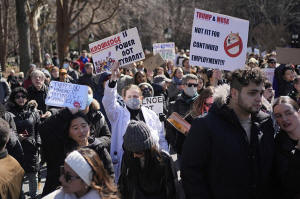Out of the lab and into the streets, researchers and doctors rally for
science against Trump cuts
[March 08, 2025]
By SETH BORENSTEIN
WASHINGTON (AP) — Giving a new meaning to the phrase mad scientists,
angry researchers, doctors, their patients and supporters ventured out
of labs, hospitals and offices Friday to fight against what they call a
blitz on life-saving science by the Trump administration.
In the nation's capital, a couple thousand gathered at the Stand Up for
Science rally. Organizers said similar rallies were planned in more than
30 U.S. cities.
Politicians, scientists, musicians, doctors and their patients made the
case that firings, budget and grant cuts in health, climate, science and
other research government agencies in the Trump administration's first
47 days in office are endangering not just the future but the present.
“This is the most challenging moment I can recall,” University of
Pennsylvania climate scientist Michael Mann told the crowd full of signs
belittling the intelligence of President Donald Trump, his cost-cutting
aide Elon Musk and Health and Human Services Secretary Robert F. Kennedy
Jr. “Science is under siege.”
Astronomer Phil Plait told a booing crowd, “We’re looking at the most
aggressively anti-science government the United States has ever had.”
Rally co-organizer Colette Delawalla, a doctoral student in clinical
psychology, said, “We're not just going to stand here and take it.”
Science communicator, entertainer and one-time engineer Bill Nye the
Science Guy challenged the forces in government that want to cut and
censor science. “What are you afraid of?” he said.
U.S. Senator Chris Van Hollen challenged the crowd, some in white lab
coats if only for show, to live up to the mad scientist moniker:
“Everybody in America should be mad about what we are witnessing.”

The crowd was. Signs being waved said, “Edit Elon out of USA’s DNA,”
“Delete DOGE not data,” “the only good evidence against evolution is the
existence of Trump” and “ticked off epidemiologist.”
Health and science advances are happening faster than ever, making this
a key moment in making people's lives better, said former National
Institutes of Health Director Francis Collins, who helped map the human
genome. The funding cuts put at risk progress on Alzheimer's Disease,
diabetes and cancer, he said.
[to top of second column]
|

People participate in a "Stand Up for Science" rally in New York,
Friday, March 7, 2025. (AP Photo/Seth Wenig)

“It's a very bad time with all the promise and momentum," said Collins.
“I'm very worried about my country right now,” Collins said before
breaking out into an original song on his guitar.
Emily Whitehead, the first patient to get a certain new type of
treatment for a rare cancer, told the crowd that at age 5 she was sent
hospice to die, but CAR T-cell therapy “taught my immune system to beat
cancer” and she's been disease free for nearly 13 years.
“I stand up for science because science saved my life,” Whitehead said.
Friday's rally in Washington was at the Lincoln Memorial, in the shadow
of a statue of the president who created the nearby National Academy of
Sciences in 1863.
From 7 million miles away from Earth, NASA proved science could divert
potentially planet-killing asteroids, former NASA Administrator Bill
Nelson said. On his space shuttle flight nearly 40 years ago, he looked
down to Earth and had a “sense of awe that you want to be a better
steward of what we’ve been given,” he said.
The rallies were organized mostly by graduate students and early career
scientists. Dozens of other protests were also planned around the world,
including more than 30 in France, Delawalla said.
Protesters gathered around City Hall in Philadelphia, home to
prestigious, internationally-recognized health care institutions and
where 1 in 6 doctors in the U.S. has received medical training.
“As a doctor, I’m standing up for all of my transgender, nonbinary
patients who are also being targeted,” said Cedric Bien-Gund, an
infectious disease doctor at the University of Pennsylvania. “There’s
been a lot of fear and silencing, both among our patients and among all
our staff. And it’s really disheartening to see.”
___
Isabella O'Malley contributed from Philadelphia.
All contents © copyright 2025 Associated Press. All rights reserved |